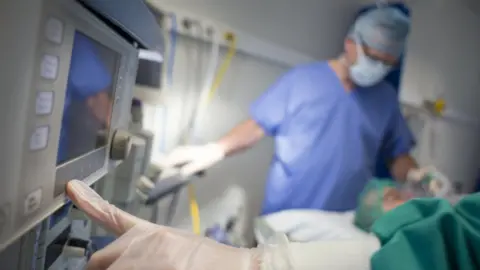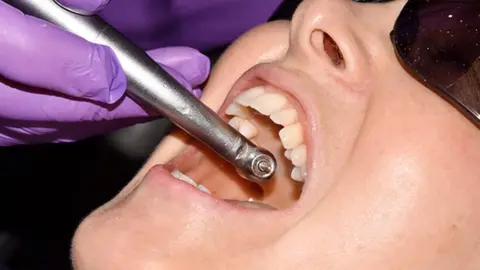'Despicable' fraud costs NHS in England £1bn a year
 Getty Images
Getty ImagesMore will be done to protect the NHS in England from "despicable" acts of fraud, the head of the health service's new anti-fraud body has said.
Sue Frith promised a crackdown as she released figures suggesting the yearly bill for fraud in the NHS topped £1bn.
Cases include patients falsely claiming for exemptions on dental and prescription fees, and dentists charging for work they had not done.
Ms Frith said the fraud takes vital funds from front line care.
Ms Frith, the chief executive of the NHS Counter Fraud Authority, said it would be looking at new ways to fight the crime.
The analysis by her team estimated that £1.25bn of fraud is being committed each year by patients, staff and contractors - the first time the health service has put a figure on total fraud committed itself.
The sum represents about 1% of the NHS budget.
If you can't see the NHS Tracker, click or tap here.

The most common frauds
The two biggest single areas of fraud were related to patients and procurement of good and services, both of which was likely to cost the NHS in excess of £200m a year each, according to Ms Frith.
She said patient fraud included cases where people wrongly claimed for exemptions for the cost of things like prescriptions and dental fees.
Meanwhile, payroll fraud was thought to be costing £90m a year, while dentists were said to be claiming around £70m in work on NHS patients that has not been done.
 DR P. MARAZZI/SCIENCE PHOTO LIBRARY
DR P. MARAZZI/SCIENCE PHOTO LIBRARYMs Frith said: "People may think it is just a small amount, but in large volumes it adds up and has an impact. It is criminal behaviour.
"It is despicable people would even claim things they are not entitled to. This is money that should be spent on front line patient care."
She acknowledged the NHS must do better at detecting and preventing fraud.
Last year investigators successfully pursued cases worth £9.6m, although another £30m of cases are pending.
But this is only a small fraction of what she suspects is out there.
Ms Frith said the £1.25bn was probably on the conservative side - previous estimates by experts have put it even higher.
She believes the new organisation, which is officially formed on Wednesday, will be able to improve on this detection rate.
It has been given independent status and allowed to focus solely on fraud.
Its predecessor organisation, NHS Protect, also covered security.
Responsibility for security has now been devolved down to local NHS trusts and the budget for tackling fraud increased by over 10%.
This will also mean more field officers to be appointed to gather evidence, as well as a greater effort on fraud prevention by reviewing contracts and systems put in place to safeguard against fraud, she said.
